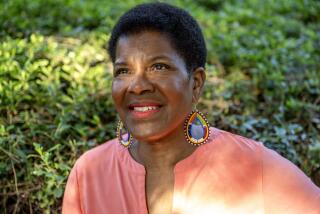Not Just for Kids: ‘I Hunt Killers’ by Barry Lyga
- Share via
I Hunt Killers
A Novel
Barry Lyga
Little, Brown: 362 pp., $17.99, ages 15 and up
A generation ago, young horror fans had to “read up” to adult authors such as Stephen King. Now novelists such as Barry Lyga are tailoring gore for a teen audience.
In “I Hunt Killers,” Lyga attempts one of the more daring concepts in recent years by a young-adult author. His multiple-murder mystery focuses on the son of a notorious serial killer who is forced to confront his fears that he will follow in his dad’s footsteps and must also reconcile his attraction to grisly deaths.
This extreme and utterly alluring narrative about nature versus nurture opens with the discovery of a naked woman’s body in a field on the outskirts of town. Seventeen-year-old Jazz Dent is observing the investigation from afar using a pair of binoculars he received as a gift from his dad before he was locked up — after committing 123 murders over a span of 21 years — for consecutive life sentences.
Jazz’s upbringing was alarmingly unusual. Raised on a steady diet of murder, he “had witnessed crime scenes the way the cops wished they could — from the criminal’s point of view.” The “trophies” in the Dent household included a lipstick, an iPod, a driver’s license and other mementos that were stashed in the basement rather than displayed on the mantle. Jazz’s brain felt “like a slasher movie.”
In real life, such a child would likely be institutionalized, universally reviled, or relocated and renamed to protect him. That isn’t the case in “I Hunt Killers,” which requires a leap of faith that Jazz has emerged from such an upbringing compassionate enough to have not only a best friend but also a girlfriend and the town sheriff as a surrogate father. Without these characters, however, Jazz would be too much of an anomalous freak. His knowledge of torture techniques alone would be too off-putting.
“I Hunt Killers” is not for the faint of heart. It’s clear from the book’s many grisly details that Lyga has done extensive research into the psychology and techniques of the serial murderer, and he uses that knowledge liberally. The story is peppered with recalled bits of wisdom imparted from the man Jazz called Dad and the public knew as Butcher Billy.
At age 9, Jazz learned how to use quicklime to dissolve body parts. At 11, he was taught how to duplicate keys. It’s unclear at what age he witnessed alternative uses for Drano, but all of this unseemly knowledge comes in handy when Jazz suspects the woman found in the field was the victim of a serial killer. When he shares his suspicion with the sheriff, however, he’s brushed off — until yet another dead body shows up in the otherwise sleepy town of Lobo’s Nod.
Jazz thinks that if he helps catch the killer it might mean he isn’t one himself. Whenever he finds himself fantasizing about murder, he repeats the mantra: “People matter. People are real. I will never kill.” Still, he isn’t entirely convinced.
Lyga does a good job of addressing the many questions and bizarre scenarios that are bound to arise in such an outrageous tale. Jazz is often asked why he didn’t stop his father, whom he describes as “a charismatic dragon who taught his child that society’s rules didn’t apply to him.”
Lobo’s Nod is often visited by victims’ families as well as serial killer groupies, both of whom seek out Jazz. Sometimes Jazz is able to chase the visitors away. Other times, his grandmother, whom he’s been living with since his dad was locked up four years earlier, handles that. Jazz’s mother went missing long ago. It’s unclear whether she was murdered and, if she was, by whom.
That answer is likely to arrive in the second book of this creepily inventive page turner of a series and possibly on TV. “I Hunt Killers” has been optioned by Warner Bros. TV.
More to Read
The biggest entertainment stories
Get our big stories about Hollywood, film, television, music, arts, culture and more right in your inbox as soon as they publish.
You may occasionally receive promotional content from the Los Angeles Times.










